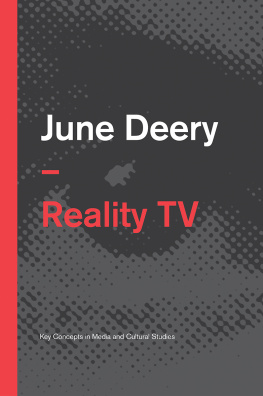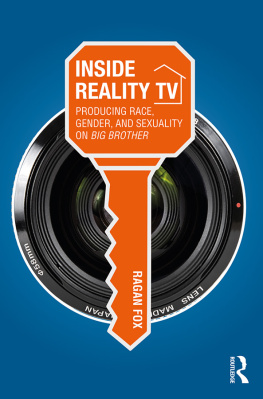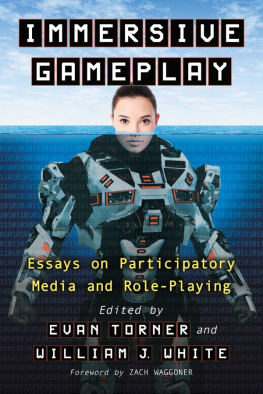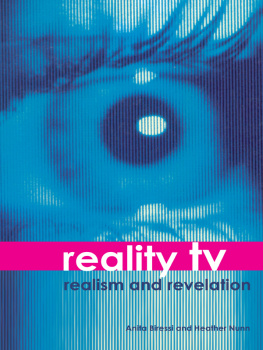Contents
Guide
Pages

Reality TV
June Deery
polity
Copyright June Deery 2015
The right of June Deery to be identified as Author of this Work has been asserted in accordance with the UK Copyright, Designs and Patents Act 1988.
First published in 2015 by Polity Press
Polity Press
65 Bridge Street
Cambridge CB2 1UR, UK
Polity Press
350 Main Street
Malden, MA 02148, USA
All rights reserved. Except for the quotation of short passages for the purpose of criticism and review, no part of this publication may be reproduced, stored in a retrieval system, or transmitted, in any form or by any means, electronic, mechanical, photocopying, recording or otherwise, without the prior permission of the publisher.
ISBN-13: 978-0-7456-9042-1
A catalogue record for this book is available from the British Library.
Library of Congress Cataloging-in-Publication Data
Deery, June.
Reality TV / June Deery.
pages cm
Includes bibliographical references and index.
ISBN 978-0-7456-5242-9 (hardback: alk. paper) -- ISBN 978-0-7456-5243-6 (pbk.: alk. paper) 1. Reality television programs--History and criticism. I. Title.
PN1992.8.R43D44 2015
791.45309--dc23
2014035165
The publisher has used its best endeavours to ensure that the URLs for external websites referred to in this book are correct and active at the time of going to press. However, the publisher has no responsibility for the websites and can make no guarantee that a site will remain live or that the content is or will remain appropriate.
Every effort has been made to trace all copyright holders, but if any have been inadvertently overlooked the publisher will be pleased to include any necessary credits in any subsequent reprint or edition.
For further information on Polity, visit our website: politybooks.com
For Alanna, John, and Doug
Acknowledgments
I am very grateful to friends and colleagues at Rensselaer who in the last few years have offered encouragement and advice: especially Ellen Esrock, Katya Haskins, Jim Zappen, Pat Search, and Debbie Kaminski. Thanks also to Patricia Murphy for keeping me in touch with the British scene, as well as our past. A sabbatical enabled me to get this project off the ground and I wish to acknowledge this gift of time and support from Dean Mary Simoni and RPI.
My thanks go to Laurie Ouellette, Misha Kavka, James Hay, Vicki Mayer, and John Corner for their inspiration, encouragement, and correspondence regarding reality TV and to Brenda Weber for organizing a stimulating conference devoted to the subject. I am grateful to Britney Summit-Gil and Jackie Bowler for feedback on the introduction and to Mark Maiellaro and Xander Cesari for their technical help. I also wish to thank the anonymous reviewers who helped me improve the manuscript and the understanding editorial staff at Polity, especially Andrea Drugan, Elen Griffiths and Ian Tuttle. It was a pleasure working with you and I appreciate your being so decent about word limits and deadlines. To Heather, Paul, and everyone at Ellis Oncology Radiology, my thanks for being extraordinarily kind and upbeat during a difficult time. Thanks also to my extended family in Northern Ireland for their good wishes and good craic.
Final thanks I owe to Alanna and John for tolerating people who write books and to Doug who has witnessed another difficult birth.
Also thanks, John, for all the fish.
Introduction : Definitions, History, Critiques
Im not here to make friends. The tribe has spoken. Youre fired! I believe in being honest. She has no class. Hes not being real. She just threw me under the bus. Move that bus! I cant believe its me/my living room/my car. Ive learned a lot about myself. She is not here for the right reasons. Will you accept this rose? I did it for the experience. I have a friend whos an expert. Make it work. Its my day! Is this your dress? Watch out bitches! This isnt the last youll hear from me
These catchphrases are heard day after day on screens around the world. Many would recognize them as the voices of reality TV, a type of programming that whether enjoyed or criticized or both has affected television in each of the areas of production, distribution and consumption. So how did this happen and why is it important?
Reality TV is important in the most basic terms because it pervades TV schedules around the world and has, as a consequence, entered all kinds of popular and elite discourse, from personal blogs to presidential politics. To dismiss reality TV because of its often trivial content would be to miss its significance. Some individual programs are of high quality, are well-conceived, or are provocative in important ways; most, on the other hand, are not. Nevertheless, it is impact, tenacity, and cultural resonance, not profundity of content, that make reality television worth analyzing. Even if it were to disappear tomorrow, it would be worth knowing why it arose and was so popular. But for so prominent a cultural form, reality TV is not often or easily defined. What is it, and just as interestingly why is it, are questions worth asking. In this study, I offer an overview for those who are looking for a broad assessment of where we are with this attention-grabbing phenomenon. Based on current critical scholarship, I have selected what I believe are the main topics and questions reality TV (RTV) poses for students of the media and of contemporary culture.
Among academics, reality TV is becoming one of the most thoroughly analyzed areas of media production. It brings to the fore issues such as: What is real or fictional, how can we recognize either, and is it disturbing if we cant? What does it mean to represent the self and what self are we encouraged to represent? How does watching ordinary people on TV relate to surveillance and governance? Is everything in contemporary culture commodifiable? Is the private still a meaningful designation? Is celebrity ordinary? And what is the role of television in a digital, mobile environment? This programming allows us to think about a cluster of contemporary concerns, including the requirement that we all perform because of surveillance, because of the marketization of everyday life, because of the demand for individual impression management. Reality TV has become emblematic of a contemporary monitoring and commercialization of performed and mediated identities. It grew in a time of transparency, with people posting intimate information about themselves on social media and conducting loud phone conversations in public. But this is also a time when many are spooked at the discovery of governmental and commercial surveillance. People are giving away privacy but are disturbed when it is not their choice. RTV works through some of these tensions and betrayals.
The nature and novelty of reality TV content also invites fundamental questions about genre, production methods, and motive. Few professional commentators make claims about reality shows being quality TV, but their popularity and durability have earned them attention and even grudging respect as something deserving analysis. Some reality formats such as the Big Brother and Idol franchises are the most successful in television history and are significant both for their national and global reach. In many instances, reality TV producers have changed the nature of television and a generation of viewers is growing up that regards unscripted TV as the norm. There are so many reality shows on American and British schedules alone that they are difficult to count: whole channels are devoted to reality programming or are dominated by it. Then, too, a shows impact often extends beyond those who view it and is widely referenced even by people who would bristle at the suggestion that they ever watched it. It is likely that people underreport or underestimate how much reality TV they watch because they dont recognize that what they watch is considered reality TV or, also likely, they underreport because of social stigma for nothing is easier to criticize in polite society than reality TV. This consensus, too, is noteworthy.









